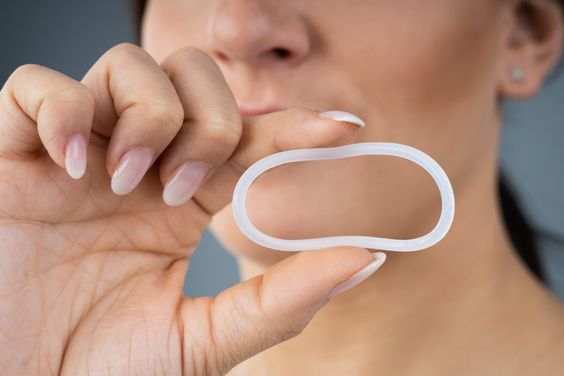Know Vaginal Ring Carefully Before Using It – Part 2
The vaginal ring is a contraception underdog. Contraception is often discussed in terms of the pill or IUDs. Depending on your needs, the vaginal ring (marketed as NuvaRing) may be a good option. Here are 14 facts about it.
Click here for Part 1: http://lavyon.com/know-vaginal-ring-carefully-before-using-it-part-1.html

8. After consulting your doctor, use the ring to control your period.
This is an off-label use of birth control. So, consult your doctor first. Cool? Cool.
So here it is: The ring-free period week may be scheduled during a time that you can not attend, such as a beach weekend. So, you may want to change or skip your period.
Remember that the ring uses progestin and estrogen to prevent pregnancy when it is in your body. When it comes out, your body lacks the extra hormones from the ring, causing you to bleed. (Don’t worry, a new ring every seven days will keep you protected.) So, if you want your period to come earlier than usual (like the week before your vacation instead of during it), you can take out your ring for that week and replace it with a new one (on the same day of the week and at the same time).
Dr. Minkin advises keeping your ring for four weeks instead of three to avoid missing your period. Dr. Minkin emphasizes that, since this is an off-label use, you should consult your doctor first. Also, try to manipulate your period this way and you may experience breakthrough bleeding.
9. The ring may cause less breakthrough bleeding than the pill.
Dr. Minkin says this benefit is more about proper usage than the ring itself. The ring uses the same hormones as the pill, so the risk of breakthrough bleeding is the same. Dr. Minkin says that with regular use, some people forget to take the pill, which increases the risk of bleeding randomly. Because you don’t have to change your NuvaRing as often as you do your pills, you’re less likely to make a mistake.
10. It may cause vaginal irritation.
According to NuvaRing.com, the most common side effects of the ring are vaginal irritation and discharge.
Dr. Minkin says this is due to a foreign object in your vagina, though she hasn’t seen this in patients. Patients who wear the ring seem fine, she says. This is also true for Maura Quinlan, an assistant professor in the Department of Obstetrics and Gynecology at Northwestern University Feinberg School of Medicine, she warns patients about it but has only seen it a few times herself.
11. If the ring falls out, you have three hours to replace it.
According to NuvaRing.com, the ring can come off when you remove a tampon, have sex, or strain when you poo. (This is why you should check your ring frequently, including after those events.) If it’s been out of your vagina for less than three hours, rinse it and re-insert it.
After three hours, clean it off and re-insert it, but use a backup method of birth control until your ring has been in place for seven days. Recycle vaginal ring if you’re in week three, or re-insert it no later than seven days after you notice the ring has fallen out (assuming you’ll have a period during that time).
If you have any questions, ask your doctor what to do if your NuvaRing falls out.
12. You can take it out during sex, but it isn’t required.
This is entirely subjective. There is no need to remove the ring during sex, but some partners may feel it during intercoure. The Mayo Clinic says you can remove your NuvaRing for up to three hours and then re-insert it.
Dr. Minkin says you’re safe during this time because the hormones are still in your bloodstream.
13. Some health conditions preclude NuvaRing use.
Contraindications include:
Arms, legs, eyes, or lungs clots: The ring, like other combined hormonal contraceptives, increases blood clotting factors, putting you at risk for blood clots. Blood clots are rare, even with combined hormonal birth control, but a personal history of clots increases the risk.
After a stroke: The ring contains ethinyl estradiol, which increases the risk of stroke. Again, most people using the ring don’t need to worry about this, but factors like a stroke history raise the risk.
Uncontrollable high blood pressure: The ring can increase blood pressure, so it’s not recommended for people with hypertension who don’t respond well to medication.
Smoking and over 35: Smoking increases your risk of serious heart and blood vessel problems, including blood clots, heart attack, and stroke. The Mayo Clinic says this risk is higher in smokers over 35.
When discussing contraceptive options with your doctor, be sure to discuss these and any other factors in your health history that may influence the type of birth control that is right for you.
14. Within a few cycles of discontinuing the use of NuvaRing, your fertility should return to normal.
The ring works by providing a constant stream of hormones while it is in place, but once removed, your body returns to normal, Dr. Dardik explains. Generally, your ovaries “wake up” fairly quickly, but some people may require several months to resume a normal cycle, Dr. Minkin says.
Consult your doctor if you experience any problems with your cycle a few months after discontinuing the use of the vaginal ring. It’s possible that the ring was masking symptoms of an underlying condition that affects your period or fertility, or that your fertility naturally changed as you aged, Dr. Minkin says. In either case, your doctor should be able to conduct some tests to ascertain the cause of the problem.

